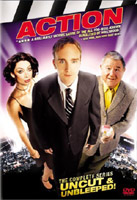 BUY IT AT AMAZON: CLICK HERE!
BUY IT AT AMAZON: CLICK HERE!
STUDIO: Sony
MSRP: $24.97
RATED: NR
RUNNING TIME: 299 min.
SPECIAL FEATURES:
• Commentaries
• Featurette
These days, anyone with a cracked copy of Final Draft on their laptop and access to a digital camera can slap a movie together, the latest big studio announcements and production rumors are a mouse-click away, and shows like HBO’s successful Entourage let armchair execs feel privy to the inner workings of the moviemaking biz.
But way back in 1999 (last century!), the Fox series Action let movie-obsessed audiences creep through the Hallowed Halls of
The Show
Peter Dragon (Jay Mohr) is an abrasive hotshot action flick producer who, after a string of hits, suddenly faces the harsh truth that in
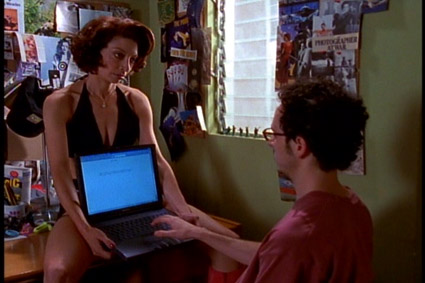
Sony’s new VAGINO T-8 laptop just shot to the top of my "to buy" list…
The 13 episodes of Action charts Peter’s attempts to stabilize his personal life and return to the top with his new, and possibly final, production (I don’t recall the show being episodic storytelling, but that’s probably because Fox treated it with all the scheduling and promotional respect of Firefly and Futurama – hell, it took Sony to finally bring the series to DVD!). Dragonfire Productions’ sniveling development chimp Stuart Glazer (Jack Plotnick) might’ve bought the wrong script, but his case of mistaken identity proves serendipitous when Peter discovers that Beverly Hills Gun Club is a diamond in the rough.
With a potentially career-resuscitating script in hand, Peter secures the services of its scrawny, neurotic writer Adam Rafkin (Jarrad Paul), but a number of obstacles still stand before him, not the least of which is Bobby Z (Lee Arenberg), the infamously well-endowed closet-homosexual studio chief who has acquired Peter’s sexy ex-wife as his own “beard”. Bobby’s unwilling to fund anything associated with such a sudden box office tragedy, so with chauffer/bodyguard/uncle Lonnie (Buddy Hackett in his final role) in tow, Peter is off to obtain the film’s financing on his own.
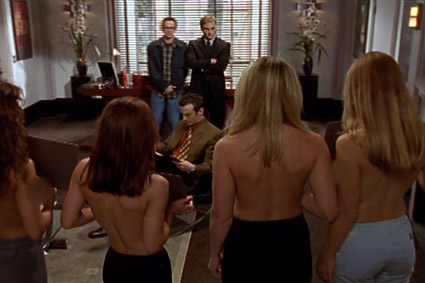
I can think of about eight good reasons to want to get into the movie business.
Things don’t go smoothly, but who says filmmaking is boring? Peter soon finds himself contending with innumerable duplicitous dealings, budgetary limitations, manipulative or inept subordinates, possible mole cancer, a jealous pimp, Middle Eastern arms dealers, actors of the high-maintenance variety (his male lead has a persistent substance abuse problem, his actress doesn’t want the crew looking at her during filming), a self-perpetuating rumor that he was admitted to an emergency room to remove a frog from his rectum, a surprise pregnancy, breast casting, finding time for his 10-year-old daughter, getting “outed” on national television, and being pronounced clinically dead after suffering an on-set myocardial infarction.
With his brusque delivery, Mohr is an absolutely ideal choice for the lewd, mouthy mercenary, and although he gets a few sensitive moments where he questions his soulless profession, he quickly returns to throwing babies and marketing cigarettes to teens. The rest of the cast follows suit with sardonic style (the homely yet oddly alluring Douglas makes for unexpectedly felicitous top-dollar whore), and besides R. Lee Ermey as a reclusive director lured out of self-imposed exile only to end up floating facedown in his pool, there’s a string of celebrity cameos — Salma Hayek scorns Peter’s casting methods, Sandra Bullock admonishes him for selling a tape of their sexcapades (on the same episode he accepts a hummer from a gay actor in a futile ego-stroking attempt), and Scott Wolf mocks his own Lilliputian stature.
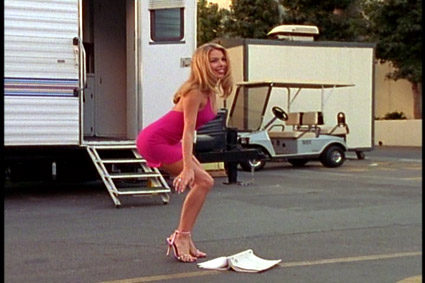
Maybe nine.
But even with the caliber of talent in front of the camera (well maybe not Scott Wolf, but hey, Party of Five was still on the air at the time), the writers are the real stars here. Action reinforces something I’ve come to understand about the
And when Peter is brought before Congress regarding the deplorable content of his films, he delivers a tirade railing on contradictory governmental policies which, seven years later, is more relevant than ever. In fact, aside from a few scraps of dated references (OJ Simpson is a recurring target of verbal barbs), and the absence of the internet’s questionable influence and the current saturation of consumer technology, Action is an accurate satire that could’ve easily been produced today. If someone actually supported it, of course. But as is generally the case, the Almighty Dollar is the One True God, and at the time of its inception the show became a casualty of HBO’s stingy disposition and unfortunately shifted to Fox, once a place that nurtured innovation and now the home of prime-time soaps and berated amateur singers. Luckily the series was filmed with all its profanity and raging vulgarity and then bleeped for network TV, and the show is finally presented with all the audacious and incisive and utterly tasteless R-rated humor intact.
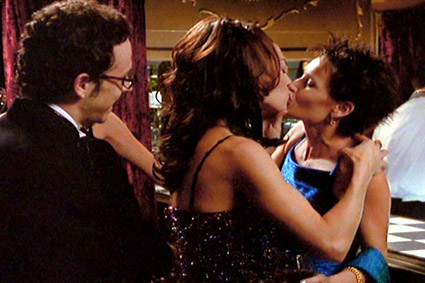
It may not be listed in Randy Newman’s song, but it oughtta be…
“We’re going to hell,” Peter confesses after making yet another devious deal in a town where you can be dropped like a live grenade after one critical decision. Then he scoots off in his personal studio lot vehicle. “But at least I ain’t walkin’.”
8.5 out of 10
The Look
In a time when TV shows are aimed squarely at a DVD future with widescreen and hi-def picture, Action’s understated fullscreen presentation is about as impressive as Slow Torture’s opening weekend, but it’s serviceable enough.
7.0 out of 10
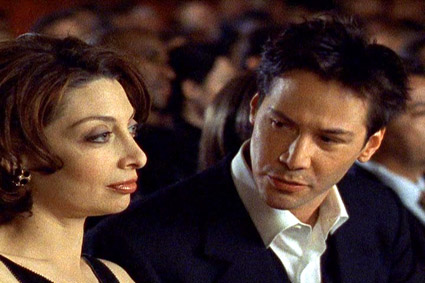
"Whoa. Your favorite movies are Johnny Mnemonic and Little Buddha? Even I don’t have taste that shitty."
The Noise
The 2.0 Dolby audio is good enough for a heavy-dialogue series. The show also gets bonus points for astute use of the late Warren Zevon’s song “Even a Dog Can Shake Hands” for a theme.
7.0 out of 10
The Goodies
A rather dreary trio of audio commentaries rounds up several writers (and the guy who played the writer) who seem to be still smarting from the show’s abrupt termination. But surprisingly they’re not especially insightful or entertaining, with a lot of coarse comments and snide remarks about certain cast members. Far more interesting is the 25-minute retrospective featuring the producers, writers and Mohr that’s brutally honest about how the show was conceived and eventually mishandled. There’s also a relatively useless "studio speak" dictionary that cuts to scenes from the show to give definitions of the terms.
The thirteen episodes (complete with interstitials) are spread over two discs, and I’ll admit I blasted through the entire set over a single lengthy evening, absorbing it like one long combination "insider" comedy, documentary, training video and cautionary tale.
4.0 out of 10
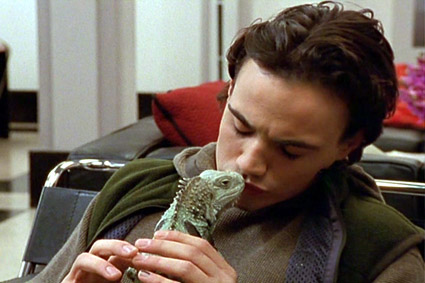
The screen collaboration everyone’s been awaiting — Skeet Ulrich and Drew Barrymore.
The Artwork
I’m not sure how well it conveys the darkly satirical nature of the series, but since I actually got to see the show when it originally aired, I’m already familiar with its greatness. The sprawl of
7.0 out of 10
Overall: 8.0 out of 10